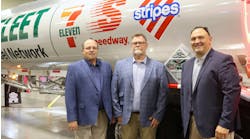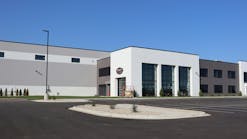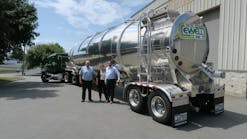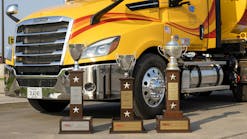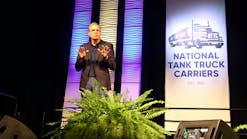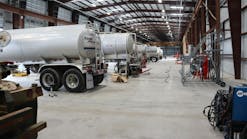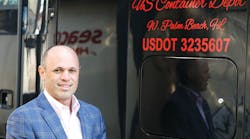Liquid Cargo president Kevin Jackson was well-prepared for his turn to assume the chairman’s mantle.
Or at least he thought he was.
His father, Mark Jackson—who led Liquid Cargo before him—was an avid National Tank Truck Carriers (NTTC) member, so he grew up around the association, progressed steadily through the executive committee ranks after joining, and even waited an extra year to allow former Gorski Bulk Transport owner Bernard Gorski to jump ahead of him in 2019.
But no one was prepared for the 2020-21 chairmanship.
Not only did a global pandemic make holding all in-person meetings impossible, including the highly anticipated 75th anniversary Annual Conference, NTTC also lost only its fourth president, Daniel Furth, in a move that, while difficult, Kevin says was necessary for the association to chart the best path forward post-virus.
Despite the challenges, he insists leading the organization that has played a pivotal role in his family’s 100-year-old business was the honor of a lifetime.
“I am proud to have been able to help steer us through this,” he said. “We’re going through a unique time for all of us, and then on top of that we’re dealing with a leadership change in the association. But I feel privileged to have participated in that, and to help set our priorities going forward.
“Honestly, I just did my best not to screw things up.”
His most difficult task was to oversee the exit of Furth, who departed as only the association’s fourth president in August, 2020. Furth was replaced in the interim by executive vice president Ryan Streblow, who, along with Moira Smith, vice president of finance and administration, guided NTTC into a more hopeful year—and what is expected to be a much-needed return to normalcy with the 2021 Annual Conference in June.
“Dan had been with us for 12-plus years (eight as president), and done some amazing things for the association,” Kevin said. “He really helped move us forward, oversaw some successes on the advocacy side, and helped bring in Britton Clarke (president of BC Consulting) as our lobbyist, and she’s been phenomenal.
“But with the unique atmosphere, it was time for both of us to go in a new direction.”
Kevin said the committee postponed picking a permanent successor due to the ongoing uncertainty caused by COVID-19, including the severity of its financial impact on the carrier and associate members whose dues support NTTC’s mission, but they planned to confirm the fifth president before the Annual Conference.
That’s when, barring further setbacks, Kevin is expected to hand the gavel to Rob Sandlin, president and CEO of Florida Rock and Tank, in person.
“Otherwise, I will be the only chairperson in history to chair an entire term in which there are no meetings,” he said.
And that’s something everyone, including his parents, cannot abide.
“They were thrilled when I was elected chairman,” Kevin said. “My mother and father haven’t been to any association meetings for several years, because they wanted to back away a little bit, so when they learned my time was coming, they made plans to attend all of the meetings in which I would be chair of the association. And then the pandemic hit, so they haven’t had that opportunity, but they still were excited.
“It’s been an honor to be in this position, and be viewed as worthy by my peers.”
Bulk Transporter: How has the COVID-19 pandemic impacted the association?
Kevin Jackson: “NTTC is fortunate that, as a small association, it has a very large endowment, so financially we knew we would be fine, and be able to get through the pandemic. But obviously it changed our approach to how we interact and work with membership. Because now we’re trying to drive engagement without any meetings. One role of the NTTC—beyond safety, advocacy and education—is networking, and how do you network when you can’t get together? That’s a big part of what we do. Networking with associate members, which are vendors for most of us, networking with each other—it becomes very difficult. So we had to find new ways to drive engagement. We had to change our whole philosophy toward meetings, because now they’ve gone from in-person to virtual. We held our first virtual membership meeting for Tank Truck Week, which actually was very successful. We had a lot of members attend, but you don’t get that same participation or personal interaction, because you’re connecting through a computer. Everybody can’t talk at once, and you can’t break out and talk with one other person while the meeting’s going on. So there are hurdles with virtual meetings we’re still working out, but hopefully, from an association standpoint, they’re few and far between going forward.”
BT: Do you regret, maybe a little, letting Bernie jump you for chairmanship, considering the year you ended up with?
KJ: “Yeah, a little. But I like a challenge, and the one thing I can safely say is nobody will ever have a chairmanship like mine. I can’t envision anybody going through another pandemic year like this, where there are no meetings, and the leadership of the association is changing. We went through a lot this year, but as an association we positioned ourselves in a strong place coming out of it for our members, which is really what the association is about. It’s about driving those membership relations and benefiting members in every way we can. And I’m not just talking about carrier members. The changes that are going to come out of this are going to benefit our associate members as well, and they’re a vital part of our association and our industry.”
BT: What industry issue are you most concerned about?
KJ: “The biggest thing for me—and not just the tank truck industry, but trucking overall—is workforce development. How do we find a way to transition individuals coming out of high school into trucks? Because quite frankly we need drivers, and our country needs drivers, and if you can’t build a path that goes from 18 to 21, and allows for future drivers to get in a truck right out of high school, you’re going to end up constantly fighting the battle of, where are our drivers going to come from? Nobody wants to spend three years in another trade, essentially apprenticing, and then move to trucking. When people are going into skilled jobs, they want to get in right away and stick with it. So NTTC and the ATA have been working with the government to try to put an apprenticeship program together, and that’s going to be the biggest initiative we push forward over the next couple of years, because I don’t see this driver shortage letting up anytime soon.”
BT: So you’d like to see younger CDL holders be allowed to cross state lines?
KJ: “Twenty-one is when drivers are allowed to begin interstate commercial activity, but most tank truck companies have their own rules that say they need a year or two more experience, so now we’re talking 23. That’s five years after high school, so it becomes difficult to get people out of whatever job they’re already doing. And so as an industry … we need to have a better mechanism to transition young drivers coming out of high school into interstate commercial transportation, and go through an apprenticeship program that allows them to become the excellent, qualified, safe drivers we need on the road. Even if it isn’t tank truck-focused, getting more drivers into trucks … helps the industry as a whole, and that will allow for tank truck companies to have a larger driver base to pull from.”
BT: Driving tank trucks traditionally has been a destination job in trucking, and tank truck carriers enjoy a lower turnover ratio than other segments. So are bulk carriers still feeling the pinch from the driver shortage?
KJ: “Absolutely. There isn’t an industry that hasn’t been touched by it, but some of the other industries—flatbeds, reefers, dry box vans—have had such a shortage of drivers that their rates have increased significantly. Tank trucks used to offer a premium. You could go there, and it was one of the higher-paying segments, but right now it’s on par with everyone else. And so, because of that, in many cases, drivers can go anywhere and make the same amount of money.”
BT: What do you see as the biggest factor in the driver shortage?
KJ: “It’s a hard job that’s not truly appreciated. Whether you listen to the radio, read a magazine or see the billboards, you hear it everywhere: ‘Have you been in an accident? Call us.’ Because truck drivers are always viewed as the villains. Who wants that job? Who wants to be the villain on the road? So there’s this negative stigma out there, whereas back in the 80s, and before, truck drivers used to be referred to as the knights of the road. And when you think about that imagery, you think about medieval warriors out protecting everybody, caring for everybody, and making sure the job gets done, and that’s who our truck drivers really are. They’re the knights of the road. But somewhere along the line that got turned around. So if we can work to rebrand the value and importance of truck driving, it becomes a much more interesting job to get into.”
BT: How important is tort reform in alleviating nuclear verdicts, and are tank truck carriers viewed as providing the biggest paydays?
KJ: “The biggest nuclear verdicts have never been with tank truck companies. In fact, tank truck companies are some of the safest companies out there. But it’s a huge fear because it’s something you don’t have a whole lot of control over. There is technology coming out that’s helping reduce accidents, like collision avoidance sensors, and cameras that are inward and outward facing, and on the sides of trucks, so you always know what’s going on around you, and where accidents are occurring. And we’re finding some accidents are being purposefully caused. I saw a video the other day of a driver who was coming up behind a truck and literally steered their car into the rear axle and then bounced off the median, went to a hospital, found a lawyer, and sued the trucking company. But they didn’t realize the trucking company had cameras that looked down the side of the truck. Now the people who filed the lawsuit are facing criminal charges. So there are people who look to take advantage of trucking companies, and unfortunately, until laws are changed, and tort reform is completed—and that’s a big push for just about every state in the country, and the ATA and NTTC—to try to mitigate some of these nuclear verdicts that will crush trucking, people will continue to look at it as a huge payday. They forget the fact that if you don’t have trucks, we don’t have a society. Trucks get everything to their final destination. Without them, we don’t have anything.”
BT: How tough was it not to be able to celebrate NTTC’s 75th anniversary in person?
KJ: “It was a blow to the association, no doubt. We were going to start celebrating the anniversary in late April, right when COVID was hitting its stride in America, and so it almost got completely overlooked, because everybody was struggling with something so much larger out there. So, yeah, it stinks that we weren’t able to have our 75th anniversary, and host our Annual Conference for it. But we still have this June’s Annual Conference, which will signal the completion of our 75th year, so maybe we can still celebrate then; and it will be the start of our 76th year, so there are ways to get around it, in terms of having a celebration. And it doesn’t change the fact that as an association we’ve been around for 75 years, helping the tank truck industry, lobbying on its behalf and working to do what our mission says: Keep our roads safe, advocate for our industry, and educate not just our membership but also the country about the value of trucking.”
BT: How much are you looking forward to the first post-COVID gathering for NTTC?
KJ: “I can’t wait to get back together. … The big question will be how many people attend. Because every state has their own criteria for reopening and travel. Florida and Texas are a little looser and more open than maybe New Jersey, New York or California, so you could have some people who can’t or won’t attend. But it will be important for us as an association to get back together, see each other again, and refocus our efforts on the new direction the country is going to be in coming out of COVID.”
BT: Are mergers and acquisitions in the tank truck space increasing?
KJ: “Mergers and acquisitions, probably over the last five years, have accelerated. There’s no doubt. There’s more money available out there, that is just sitting, and when you have money sitting, people need to do something with it, because everybody wants to continue to grow and invest their capital. And so we have seen a lot of mergers and acquisitions, and I would assume coming out of COVID we’ll continue to see more. Even in the last three months or so, the number of phone calls and emails I’ve received from investment companies and brokers has risen significantly, because people are seeing that trucking is coming back, there’s a high demand for it, and the organic growth that used to drive trucking is dwindling. When you can’t find drivers, you can’t grow organically, and so the only way to grow is through acquisitions. And so with equity companies becoming more and more involved, there are a lot more rollups occurring, and that’s good and bad. It gives people a way to exit the industry, which is terrific, because there are family businesses that have no succession plan, and they need to go somewhere, and all of those drivers need to know they have a home. So that’s a positive. And equity companies typically bring money, and bring investment in technology, which is vital to the trucking industry. But it also creates disparity. When there’s a lot of money invested in a handful of companies, you end up with the top and everybody else, and that can make things difficult because a smaller company may not be able to invest in the same things as a larger company with financial backing, so they have to find other ways to distinguish themselves from more technologically advanced companies.”
BT: What should carriers consider when thinking about whether or not to allow private-equity investment?
KJ: “That’s a tough question because every trucking company is different. If you have a generation that’s looking for a way out, but isn’t quite ready to retire, what they might be looking for—and this is not a negative—is the best payday for the hard work that created the company they have, and there’s nothing wrong with that. For the younger generation that might be taking over, they might want to look at growth opportunities, and so they’re looking for a financial partner who’s going to allow them to grow the company, and not necessarily hold their hands or tie them down. So it really depends on the ownership, and what the end goal would be … and that’s going to be different every time.”
BT: Is there still room for family-owned businesses, or will private equity eventually control everything?
KJ: “There’s always room for family-owned and smaller trucking companies, because we tend to bring a different approach to business than private equity, which typically is looking at market share, size and investment opportunity, and a return on their investment. Smaller family businesses might be looking for strategic partnerships with customers, where they’re providing a higher level of service that the customer needs and also is willing to pay for. Not every customer out there wants the cheapest truck. Some of them want the most reliable truck and are willing to pay for it, so there’s always going to be a need for different levels of company size and type.”
BT: How do you see the changes in Washington affecting the industry?
KJ: “Every election brings with it a certain amount of change and a certain amount of consistency. There’s more likely to be more regulations with the new administration, and obviously more regulations pose a risk, as far as the costs associated with them. The new administration likely will make a larger push for environmental protection, which isn’t necessarily a bad thing, but they probably will push regulations on air quality related to trucks. And the concern with some of these regulatory items—and this goes back to the large and small trucking companies—is that larger companies with equity behind them are more versatile when it comes to adapting to some of these requirements that might come down. Smaller companies might not have the flexibility to go out and invest in all of the new environmental technology, and that does pose a risk of driving smaller companies out of business because they can’t afford to make the changes. But as an association we have to work with all sides. We try not to view it as our side and their side, or red and blue. It’s about education. We want to help educate every congressperson, and everybody in the administration, as to the benefits of trucking, the areas we know we can continue to improve on, and some of the areas we need help with.”
BT: What do you want to be your legacy as NTTC chairman?
KJ: “What I see as my legacy started just before I became chairman, and that was the creation of the young executive committee, or young executive’s club, within the NTTC, which now has a seat on the executive committee. It’s important that every association has a welcoming area for the next generation, and that was the purpose of that committee. It’s been a great avenue for younger individuals in the industry to get together and talk about some of the issues they face, questions they have, and things they might not feel comfortable asking people who know the answer. That’s really the thing I’m most proud of.”

